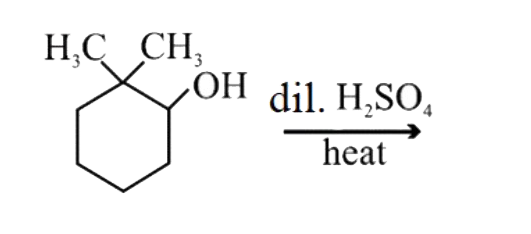Assertion: The reactant which is present in large amount limits the amount of product formed is called limiting reagent.
Reason : Amount of product formed does not depend upon the amount of reactants taken.
If both assertion and reason are true and reason is the correct explanation of assertion
If both assertion and reason are true but reason is not correct explanation of assertion.
If assertion is true but reason is false.
If both assertion and reason are false.
To solve the question, we need to analyze both the assertion and the reason provided.
Step 1: Understand the Assertion
The assertion states: "The reactant which is present in large amount limits the amount of product formed is called limiting reagent."
- Analysis: This statement is incorrect. The limiting reagent is actually the reactant that is present in a smaller amount and gets completely consumed during the reaction, thus limiting the amount of product formed. The reactant in excess (present in large amount) does not limit the product formation.
Step 2: Understand the Reason
The reason states: "Amount of product formed does not depend upon the amount of reactants taken."
- Analysis: This statement is also incorrect. The amount of product formed in a chemical reaction is directly dependent on the amount of the limiting reagent. If the limiting reagent is consumed, the reaction stops, and no more product can be formed, regardless of the amount of other reactants present.
Conclusion
Both the assertion and the reason are false. Therefore, the correct answer is that both statements are incorrect.
Final Answer
Both the assertion and the reason are false.
---
The assertion states: "The reactant which is present in large amount limits the amount of product formed is called limiting reagent."
- Analysis: This statement is incorrect. The limiting reagent is actually the reactant that is present in a smaller amount and gets completely consumed during the reaction, thus limiting the amount of product formed. The reactant in excess (present in large amount) does not limit the product formation.
The reason states: "Amount of product formed does not depend upon the amount of reactants taken."
- Analysis: This statement is also incorrect. The amount of product formed in a chemical reaction is directly dependent on the amount of the limiting reagent. If the limiting reagent is consumed, the reaction stops, and no more product can be formed, regardless of the amount of other reactants present.
Both the assertion and the reason are false. Therefore, the correct answer is that both statements are incorrect.
Both the assertion and the reason are false.
Topper's Solved these Questions
- SOME BASIC CONCEPTS OF CHEMISTRY BOOK - NCERT FINGERTPS ENGLISHCHAPTER - SOME BASIC CONCEPTS OF CHEMISTRY EXERCISE - Nature, Properties Of Matter And Their Measurements
5 Videos
- SOME BASIC CONCEPTS OF CHEMISTRY BOOK - NCERT FINGERTPS ENGLISHCHAPTER - SOME BASIC CONCEPTS OF CHEMISTRY EXERCISE - Uncertainty Of Measurement
12 Videos
- SOME BASIC CONCEPTS OF CHEMISTRY BOOK - NCERT FINGERTPS ENGLISHCHAPTER - SOME BASIC CONCEPTS OF CHEMISTRY EXERCISE - EXEMPLAR PROBLEMS
10 Videos
- REDOX REACTIONSBOOK - NCERT FINGERTPS ENGLISHCHAPTER - REDOX REACTIONSEXERCISE - Assertion And Reason
15 Videos
- STATES OF MATTER BOOK - NCERT FINGERTPS ENGLISHCHAPTER - STATES OF MATTER EXERCISE - Assertion And Reason
15 Videos
Similar Questions
Essential fatty acids are present in large amount in
View SolutionWhich protein is present in largest amount in human body :-
View SolutionAnimals which excrete large amount of ammonia are
View SolutionConsider the reaction

The alkene formed in major amount is
View SolutionColligative properties depend on ___
View SolutionThe product which is obtained in least amount on the direct nitration of aniline is
View SolutionAmong the following components of cement which is present in highest amount ?
View SolutionDoes the rates of the reaction depend on the amount of δ+ on the attacked C of RX?
View SolutionWhich organelle can store large amount of calcium ?
View SolutionAssertion (A) : When a catalyst is added to a reaction mixture in equilibrium the amount of the products increases.
Reason (R) : The forward reaction becomes faster on adding the catalyst.
View Solution
